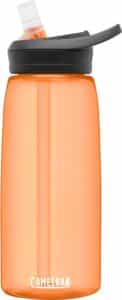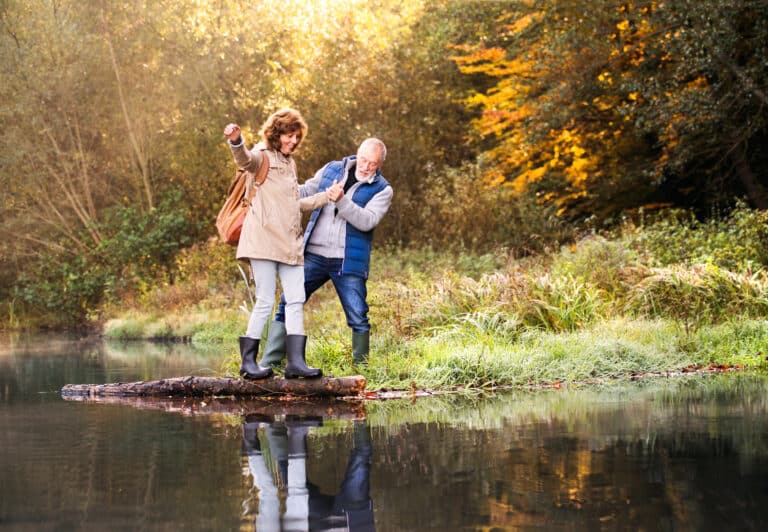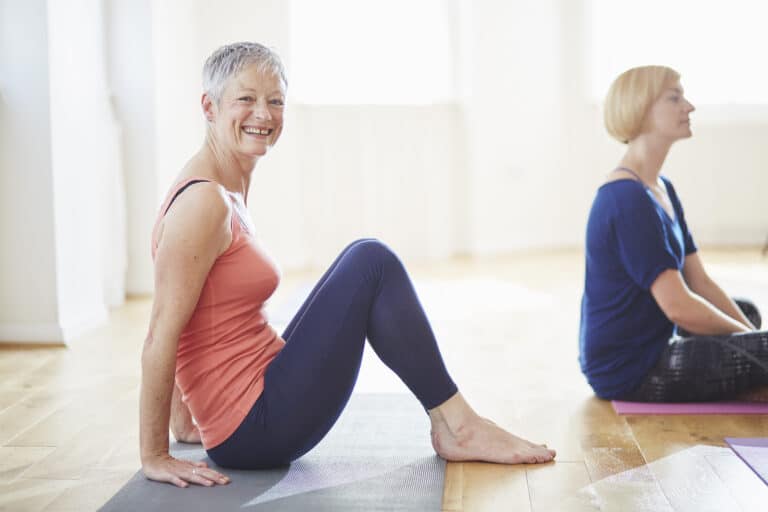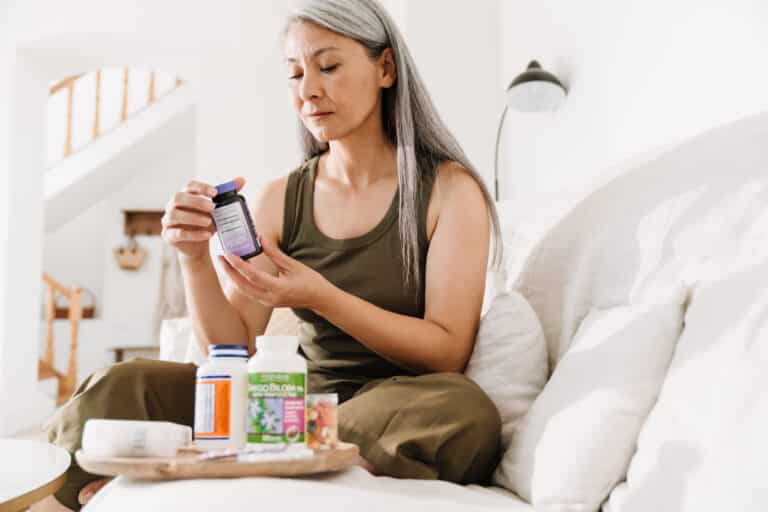Dealing with the heat can be particularly challenging for older adults, whose bodies struggle more with temperature regulation and hydration.
As temperatures rise, it’s essential to understand the unique risks and take proactive measures to stay safe and comfortable.
From choosing the proper clothing to staying hydrated and recognizing the signs of heat-related illnesses, there are practical steps you can take that can make a significant difference.
By being mindful of these strategies, you can better manage the summer heat and enjoy the season without compromising your health.
Why Heat Impacts Older Adults More
Older adults, especially those who are frail or otherwise vulnerable, are more prone to developing issues during a heat wave that may even be fatal.
Two of the primary things to consider this summer are how your body reacts to heat as you get older, and how to stay hydrated.
Impaired Blood Flow & Heat Regulation
As we age, our cardiovascular system can become less efficient, making it harder for the body to pump blood and regulate temperature. This reduced efficiency means your body may struggle to cool itself down effectively during heat exposure.
The natural process of sweating, which helps to dissipate heat, is often less effective in older adults. This impaired thermoregulation can rapidly increase core body temperature, heightening the risk of heat exhaustion and heatstroke.
Furthermore, the heart must work harder to pump blood to the skin’s surface to facilitate cooling, which can be particularly challenging for those with pre-existing heart conditions. This can lead to severe cardiovascular events during extreme heat.
Dehydration
In addition to cardiovascular challenges, older adults are more susceptible to dehydration and the effects of high indoor temperatures. High indoor temperatures, often exacerbated by the reluctance to use air conditioning due to cost concerns, can create a dangerous environment for seniors.
This means that prolonged exposure to heat in your home can decrease physical capacity, making everyday activities more strenuous and increasing the risk of heat-related illnesses.1
Let’s take a deeper look a hydration, as well as how to tell if you’re not drinking enough water.
Stay Hydrated
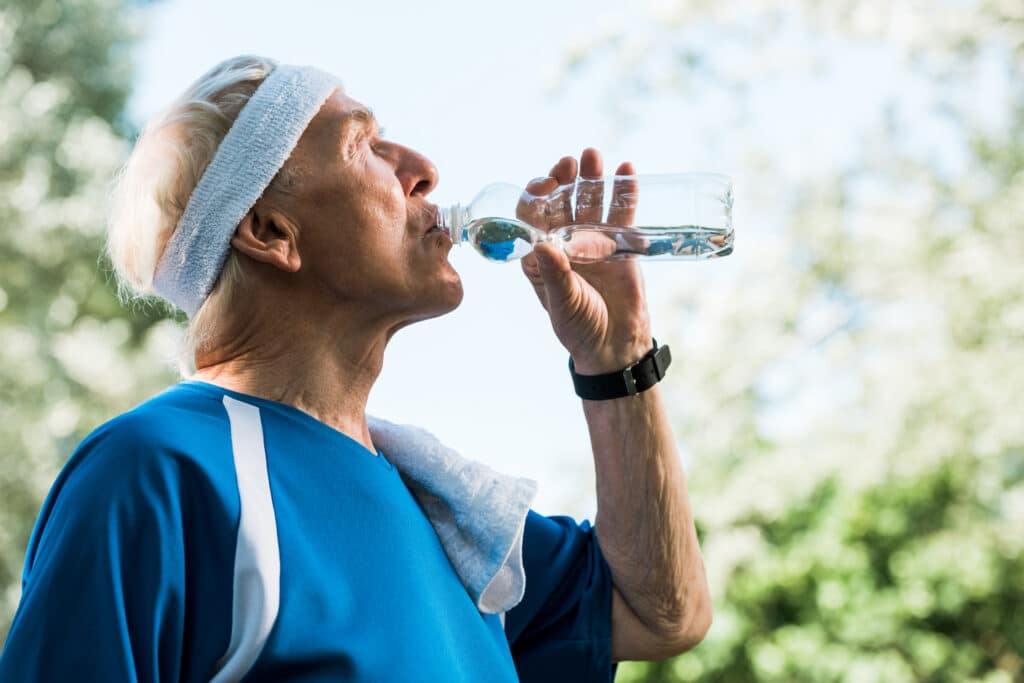
Hydration is one of the most critical factors for seniors to consider during the summer. Dehydration can occur quickly and unexpectedly, and it’s one of the most important aspects of dealing with the heat.
Aging reduces the body’s ability to conserve water. At the same time, the sense of thirst diminishes, making seniors less likely to drink adequate fluids. This vulnerability is worsened by the body’s reduced ability to conserve water, alongside an all-too-common reliance on medications that can further dehydrate the body.
Seniors should aim for at least eight glasses of water daily. A simple way to meet this standard is to carry a water bottle when going out and set reminders to drink water regularly.
This Is the Water Bottle We Use
Okay, yes, we know there are a million choices of water bottles out there. So what makes one better than another? Simple. It’s the one that you will use.
The CamelBak eddy+ Water Bottle is a big favorite of ours for a number of reasons. First, the straw functions really well, and makes sipping throughout the day much less of a project. It also doesn’t leak, which is nice when it rolls around on the car floor.
Then there’s the colors. Lots of colors. It seems a bit silly to give it credit for this, but it goes back to our original point about the finding the best water bottle. Being able to choose the perfect color for yourself makes it that much more likely you’ll love your choice. Simply, it will be the one that you use.
Our recommendations are the same items we trust and prescribe to patients. When you buy through links like this on our site, we may earn an affiliate commission to support new content.
How To Tell If You’re Becoming Dehydrated
It’s also important to monitor fluid intake by observing the color of your urine. Darker urine is a sign of dehydration and indicates the need for more fluids.
Increasing your fluid intake doesn’t only mean drinking more water or other hydrating liquids. Including fruits and vegetables with high water content, such as cucumbers, watermelon, and strawberries, can also help maintain proper hydration.
Moreover, being mindful of beverages that can dehydrate you is essential. Drinks containing caffeine or alcohol can increase fluid loss, so it is wise to limit these, especially during hot weather. If you do consume these beverages, make sure to compensate by drinking extra water.
Dress Appropriately

Choosing the proper clothing can significantly impact your comfort and safety during hot weather.
Lightweight and loose-fitting clothes allow for better air circulation, helping to keep you cool by facilitating the evaporation of sweat. Natural fibers such as cotton and linen—as well as dry-fit materials— are excellent choices because they are breathable and absorb moisture, making them ideal for hot and humid conditions.
Additionally, wearing light-colored fabrics can reflect, rather than absorb, the sun’s rays, reducing the heat your body retains. This simple yet effective choice can significantly affect overall comfort during the summer months.
Conversely, dark and synthetic fabrics can trap heat and cause overheating, making them less suitable for hot weather. Synthetic materials like polyester and nylon often do not breathe well, trapping sweat and heat against the skin. This can lead to discomfort and increase the risk of heat-related illnesses such as heat exhaustion or heat stroke.
Choosing the appropriate fabrics during the hotter parts of the year helps you beat the heat. By selecting the proper clothing, you can stay cooler, more comfortable, and safer in the heat.2
Use Air Conditioning
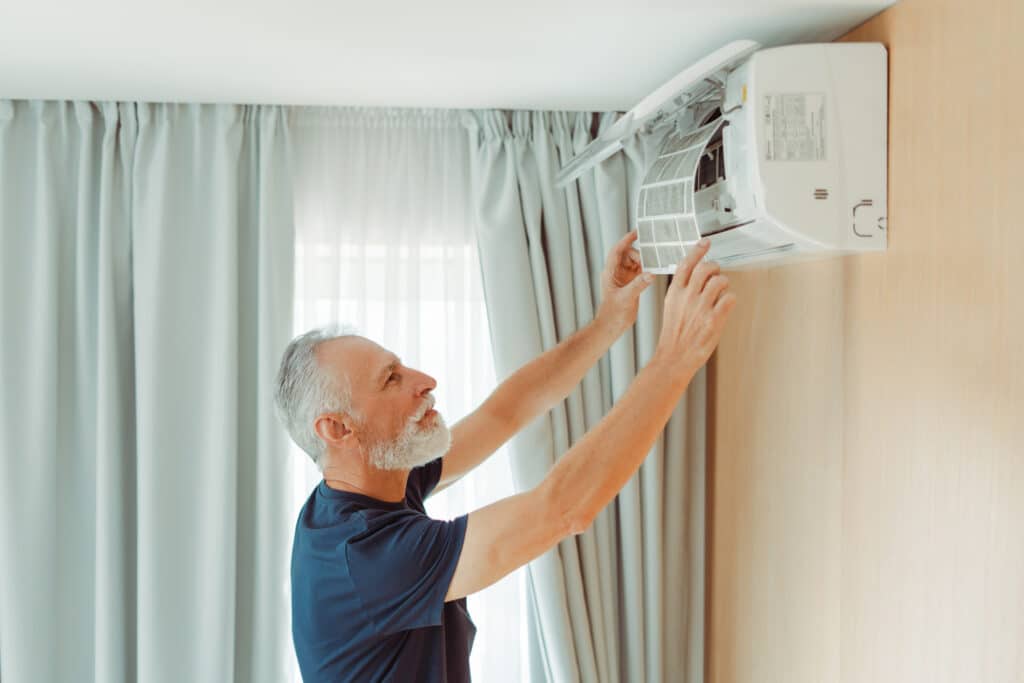
Older adults often avoid using air conditioning due to concerns about high electricity costs or simply because they do not notice the rising temperature. This phenomenon is frequently compared to the “frog in warming water” analogy, where gradual temperature increases go unnoticed until it is too late.
To manage this, setting a budget specifically for air conditioning can help ensure you stay cool without financial stress. It’s essential to prioritize your health and safety by allocating funds to cover the cost of running the air conditioner during peak heat times.
Many utility companies offer programs to help seniors with energy costs, so investigating these options can keep your home cool affordably. Some companies provide discounts, energy efficiency audits, or payment plans that spread the cost over a more manageable period.
Regular Air Conditioner Maintenance is Key
Regular air conditioning unit maintenance is also essential for optimal performance, which can reduce energy costs. A well-maintained air conditioner operates more efficiently, using less electricity to achieve the same cooling effect.
Simple tasks like replacing filters, checking for leaks, and ensuring the thermostat functions correctly can extend the unit’s lifespan and improve efficiency.
Limit Sun Exposure

Depending on where you live, dealing with the heat might be as simple as staying indoors during the hottest parts of the day.
The sun’s rays are strongest between 10 AM and 4 PM, making this period the most hazardous for prolonged outdoor activities.
During these hours, staying indoors or in the shade is a good idea to avoid the risks associated with excessive sun exposure, such as heat stroke, dehydration, and skin cancer.
Get Out Early & Use Sun Protection
By planning outdoor activities for early morning or late evening, when the sun’s intensity is lower, you can enjoy the benefits of being outside without the heightened risk of heat-related illnesses. This approach reduces the risk of overheating and helps protect the skin from harmful ultraviolet (UV) rays.
When outside, wearing wide-brimmed hats and sunglasses is crucial to protect the face and eyes from direct sunlight. Applying broad-spectrum sunscreen with at least SPF 30 protects against UVA and UVB rays, reducing the risk of sunburn and long-term skin damage.
Sunscreen should be applied generously to all exposed skin and reapplied frequently every two hours—more if swimming or sweating.
Additionally, seeking shade whenever possible, such as under trees, umbrellas, or canopies, can significantly lower exposure to direct sunlight.
Taking these precautions can allow you to safely enjoy the outdoors while minimizing the risks of sun exposure.2
Stay Fit and Active
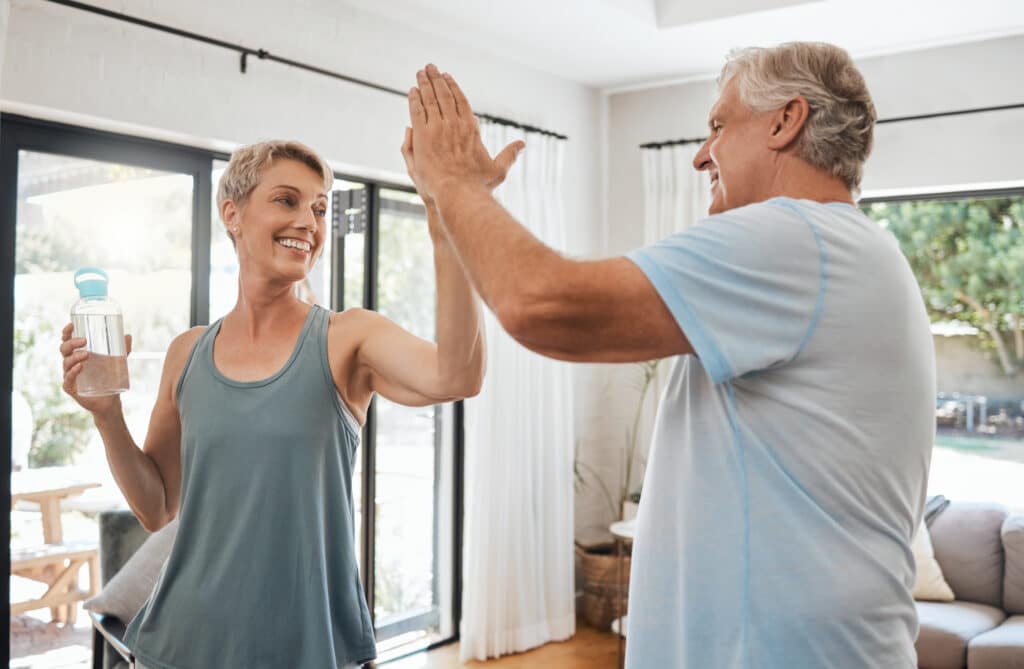
Improving fitness levels as an older adult is crucial for enhancing resilience against the physical impacts of rising heat levels.
Although it might seem contradictory when it’s hot out, regular physical activity improves cardiovascular health, strengthens muscles, and enhances overall endurance, which is beneficial in coping with heat stress.
Aerobic exercises like walking, swimming, or cycling can boost cardiovascular efficiency, making it easier for the body to regulate temperature during hot weather. If possible, it’s also a good idea to exercise indoors, in an air-conditioned facility.
Strength training exercises help maintain muscle mass and strength, which can support activities of daily living and reduce the strain of heat-induced physical exertion.
Moreover, regular exercise improves the body’s ability to sweat efficiently, aiding in cooling down during periods of heat exposure. By incorporating exercise into their routines, older adults can improve their physical capacity to withstand heat, reducing the risk of heat-related illnesses.1
Finally, I can’t emphasize enough the importance of hydration. Even if you don’t drink water often, it can be a lifesaver when dealing with intense heat. Drink extra water, especially if you’re exercising on a hot day.
Dealing With The Heat: Signs of Heat-Related Illness
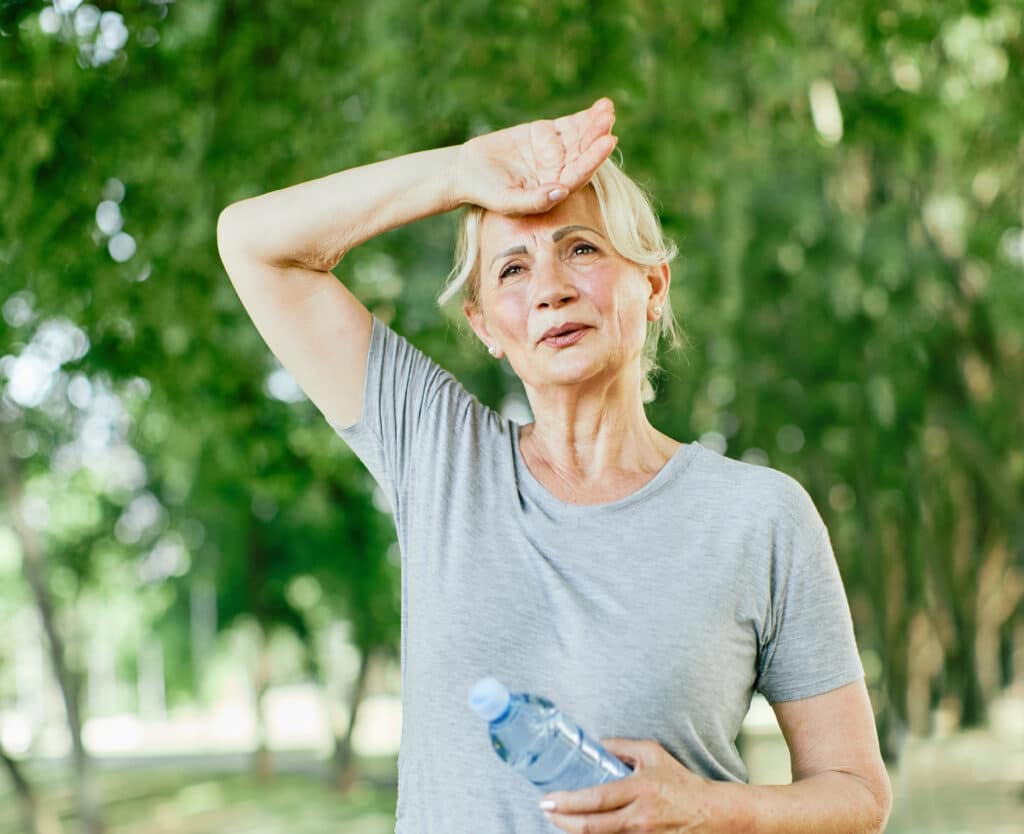
Heat-related illnesses can escalate quickly, so seniors need to be aware of the symptoms and take immediate action if they occur.
Heat exhaustion symptoms include heavy sweating, weakness, cold or clammy skin, and fainting. If these symptoms occur, it’s crucial to move to a cooler place, loosen clothing, sip water, and apply a cool, wet cloth to the body.
Heat stroke is a medical emergency characterized by a high body temperature (above 103°F), hot, red, dry, or damp skin, a fast, strong pulse, and possible unconsciousness. In such cases, call 911 immediately and try to cool the person until help arrives.
Severe reactions may mean more than simply ‘dealing with the heat’—they could be a signal for life-threatening conditions that need immediate attention.
Stay Connected
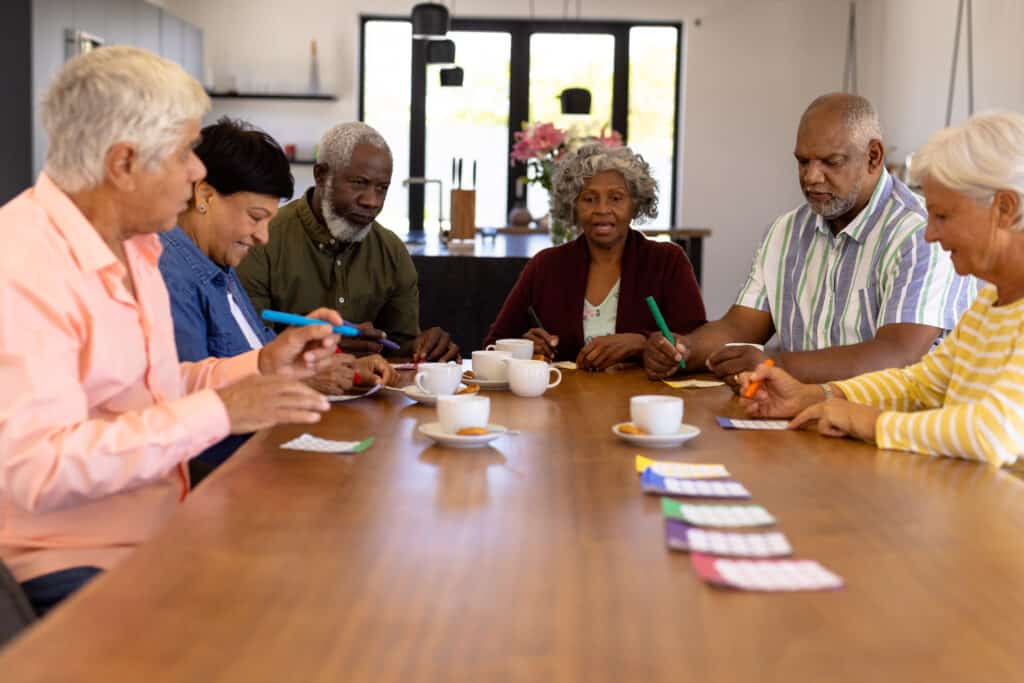
Social isolation can be more common among older adults and even dangerous during extreme weather conditions.
When you live alone, you may not have anyone immediately available to notice signs of distress or to provide assistance if needed. Therefore, arranging for family, friends, or neighbors to check in regularly is vital, especially during heat waves.
Regular check-ins from family and friends can be as simple as a daily phone call or a brief visit to ensure everything is alright. These interactions provide a safety net and contribute to emotional well-being by reducing feelings of isolation.
Look to Your Community for Support
Many communities have centers providing seniors with air-conditioned spaces and social activities, offering comfort and companionship. These centers often organize exercise classes, arts and crafts, games, and social events, which can be an excellent way for seniors to stay engaged and connected.
Spending time in these air-conditioned environments can help prevent overheating and dehydration. At the same time, social interactions can enhance mental health and overall quality of life.
By utilizing loved ones and community resources you can create a supportive network that promotes physical and emotional health. Talk to your doctor if you’re looking for new ways to participate in community activities and maintain regular social contacts.3
Know Your Medications
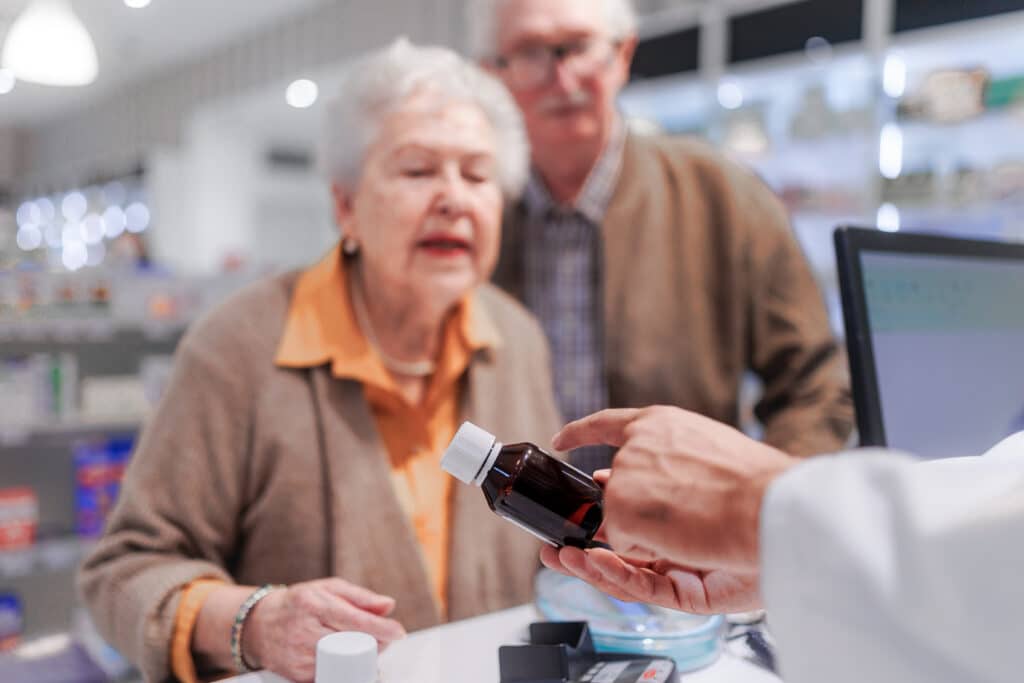
Certain medications can affect how your body responds to heat, making it essential to understand their impact, especially during the summer.
Medications such as diuretics, antihistamines, and medicines for blood pressure and heart conditions can influence your body’s ability to regulate temperature and maintain proper hydration.
Diuretics, for example, increase urine output, which can lead to dehydration more quickly. Antihistamines can reduce sweating, which is the body’s natural cooling mechanism.
At the same time, some blood pressure medications can decrease blood flow to the skin, reducing the ability to cool down.
Talk To Your Doctor Or Pharmacist If You’re Unsure
It is essential to talk with your healthcare provider about how your medications may impact your heat tolerance and follow their advice on managing medications during hot weather.
Your doctor can provide specific recommendations, such as adjusting dosages or switching to alternative medicines that have less impact on your heat tolerance, if necessary.
You can always consult your local pharmacist if you have any prescription related questions as well.
Regular check-ins with your healthcare provider are crucial to ensure your medication regimen is appropriate for dealing with the heat and managing your health needs.
Key Takeaways
- Older adults are more vulnerable to heat due to less efficient cardiovascular systems and impaired sweating.
- High indoor temperatures and reluctance to use air conditioning can increase the risk of heat-related illnesses.
- Seniors should stay hydrated by drinking at least eight glasses of water daily and consuming water-rich fruits and vegetables.
- Avoid drinks with caffeine or alcohol, as they can cause dehydration.
- Wear lightweight, loose-fitting, light-colored clothing to stay cool and avoid synthetic fabrics.
- Use air conditioning and seek utility programs for cost assistance to maintain a cool indoor environment.
- Limit sun exposure between 10 AM and 4 PM and wear protective clothing, hats, and sunscreen.
- Stay fit and active to improve cardiovascular health and resilience against heat stress.
- Recognize signs of heat-related illnesses like heat exhaustion and heat stroke and immediately act if symptoms occur.
- Maintain social connections and arrange for regular check-ins to reduce the risk of heat-related distress.
- Understand how medications can impact heat tolerance and consult healthcare providers for guidance during hot weather.
References
- Stapleton, Jill M et al. “Do older adults experience greater thermal strain during heat waves?.” Applied physiology, nutrition, and metabolism = Physiologie appliquee, nutrition et metabolisme vol. 39,3 (2014): 292-8. doi:10.1139/apnm-2013-0317
- Liu, T., Xu, Y.J., Zhang, Y.H. et al. Associations between risk perception, spontaneous adaptation behavior to heat waves and heatstroke in Guangdong province, China. BMC Public Health 13, 913 (2013). https://doi.org/10.1186/1471-2458-13-913
- Lindemann, U., Skelton, D. A., Oksa, J., Beyer, N., Rapp, K., Becker, C., & Klenk, J. (2018). Social participation and heat-related behavior in older adults during heat waves and on other days. Zeitschrift für Gerontologie und Geriatrie, 51(5), 543-549.



